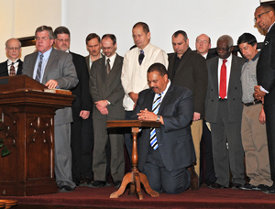The Ordination of Men to the Ministry
 Reprinted with permission from Faith Pulpit (Jan-Mar, 2011). Photo: Baptist Bulletin.
Reprinted with permission from Faith Pulpit (Jan-Mar, 2011). Photo: Baptist Bulletin.
Ordination to the gospel ministry is a significant and solemn event in a man’s life.1 Churches should understand the Biblical teaching about ordination so they can conduct the procedure in a proper manner.
The General Pattern
Ordinations today generally follow the same pattern. The church, after observing its pastor or assistant pastor for a period of time, decides to call a council to consider the advisability of ordaining him. In addition to some of its own members,2 the church usually seeks the input of men from area churches.3 On the designated day the church and the council members convene to hear the candidate give his salvation testimony, state his call to the ministry, and express his doctrinal positions. In most cases, the individual prepares a written statement of each doctrine. During the session the candidate summarizes his views on each doctrine, followed by questions from the council members.
After the examination, the candidate is dismissed and the council members share their thoughts on the man. If the council is satisfied that he evidences a call to the ministry and is orthodox in his theology, it recommends to the church that it proceed with the ordination. The church then votes to ordain their pastor or assistant pastor at an upcoming service.
At the end of the ordination service, the deacons and ordained men in the congregation lay their hands on the man, formally setting him aside for the ministry.
 Reprinted with permission from
Reprinted with permission from  Reprinted with permission from
Reprinted with permission from 

Discussion